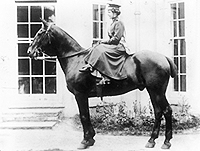• palfrey •
Pronunciation: pahl-fri • Hear it!
Part of Speech: Noun
Meaning: Saddle horse as opposed to a stallion or charger, a docile horse, especially a lady's horse.
Notes: Here is a word you don't hear much anymore, although it is in all the major dictionaries. I suppose it's because ladies seldom ride horses these days. It has only one derivational relative, palfrenier "(horse) groom", long since obsolete.
In Play:  Back in the days long passed, gentlemen rode chargers and ladies rode palfreys: "When Phil Anders made a pass at Lady Gwyneth on horseback, she charged away on her remarkably swift palfrey." We don't pay much attention these days to equine attitudes: "Royce expected them to saddle him up a mild-mannered palfrey, but, instead, they provided him with a barely broken wild horse."
Back in the days long passed, gentlemen rode chargers and ladies rode palfreys: "When Phil Anders made a pass at Lady Gwyneth on horseback, she charged away on her remarkably swift palfrey." We don't pay much attention these days to equine attitudes: "Royce expected them to saddle him up a mild-mannered palfrey, but, instead, they provided him with a barely broken wild horse."
Word History: This word was borrowed from Old French palefrei or palefreid, inherited from Medieval Latin palafredus. The Medieval Latin word was an altered form of Latin paraveredus "post horse", originally "extra horse", created from Greek para "beside, extra" + Latin veredus "courier horse". The Latin word was also snitched by Old High German as pfarifrid, which became the Modern German word Pferd "horse". Veredus was probably borrowed from Gaulish voredos, from Celtic wo-red- "fast-ride, horse", source also of Welsh gorwydd "horse" and red-, the source of Irish reidid "ride". Red- goes back to the PIE word reidh- "to ride", which also produced English ride, raid, and road. English also derived its ready from this word, apparently the original meaning was "ready for riding". German bereit "ready" seems to have undergone the same shift in meaning.
P.S. - Register for the Daily Good Word E-Mail! - You can get our daily Good Word sent directly to you via e-mail in either HTML or Text format. Go to our Registration Page to sign up today!




